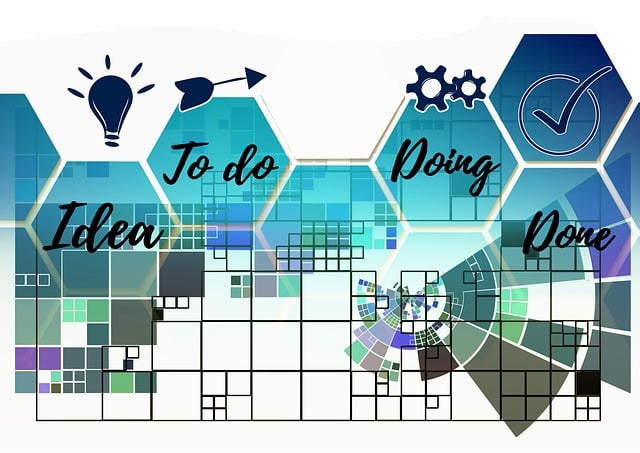AI workflow for digital marketing revolutionizes strategies by automating tasks, enhancing efficiency through data insights, and personalizing customer interactions. Chatbots improve engagement, while automation in e-commerce boosts sales experiences. This integrated approach optimizes campaigns, strengthens brand visibility, and enhances customer relationships, giving businesses a competitive edge in the dynamic market by leveraging AI tools for streamlined, effective marketing processes.
In the dynamic landscape of digital marketing, Artificial Intelligence (AI) is no longer a buzzword but an indispensable tool. AI Workflow Integration for End-to-End Campaigns offers a transformative approach, streamlining processes from concept to execution. This article delves into the pivotal role of AI in enhancing campaign effectiveness, outlining key steps like understanding objectives, integrating AI tools seamlessly, and tracking success through data-driven optimization. Discover how AI empowers marketers to create intelligent, efficient, and ultimately successful campaigns.
- Understanding AI's Role in Digital Marketing
- Setting the Stage: Campaign Objectives
- Integrating AI Tools for Efficient Workflows
- Measuring Success: Tracking and Optimizing Campaigns
Understanding AI's Role in Digital Marketing

In today’s digital era, Artificial Intelligence (AI) has emerged as a powerful tool for revolutionizing marketing strategies. Understanding AI’s role in digital marketing involves recognizing its ability to streamline processes and enhance efficiency across various stages of an end-to-end campaign. By integrating AI workflow into marketing strategies, businesses can automate repetitive tasks, gain valuable insights from data analysis, and personalize interactions with customers. AI sales tools, for instance, can predict customer behavior, enabling marketers to create targeted campaigns that drive conversions.
Moreover, the implementation of AI chatbots on websites and social media platforms enhances customer engagement by providing instant support and answering queries 24/7. In e-commerce, AI automation improves shopping experiences through product recommendations and inventory management, thereby increasing sales and customer satisfaction. Ultimately, leveraging AI workflow for digital marketing allows businesses to optimize their strategies, making them more competitive in a dynamic market.
Setting the Stage: Campaign Objectives

In the realm of digital marketing, setting a clear stage for your campaigns is paramount to success. Defining campaign objectives is the first step in this process, and it’s where an AI workflow can truly shine. By integrating artificial intelligence into your digital marketing strategies, you gain a powerful tool to enhance every aspect of your end-to-end campaigns. From target audience identification to personalized content creation, AI chatbots and assistants can automate and optimize these tasks, ensuring each campaign is tailored for maximum impact.
Understanding your desired outcomes—whether it’s increased brand awareness, higher conversion rates, or improved customer retention—is crucial. With the assistance of AI chatbot automation, you can efficiently gather insights, analyze behaviors, and make data-driven decisions. This enables a more precise targeting strategy, delivering relevant content to the right people at the opportune moments. Moreover, an AI assistant can help manage campaign logistics, ensuring every element runs smoothly and coherently, from initial conception to final execution.
Integrating AI Tools for Efficient Workflows

In today’s digital era, integrating AI tools for efficient workflows is no longer a consideration but a necessity for businesses aiming to stay competitive. AI workflow integration empowers digital marketing strategies by streamlining processes from initial planning to campaign execution and analysis. For instance, AI automation agencies can develop custom solutions for e-commerce platforms, optimizing product recommendations and personalized customer journeys through predictive analytics.
This innovative approach enhances overall efficiency, enabling marketers to focus on creative aspects while AI handles repetitive tasks. By leveraging ai automation, businesses can achieve remarkable results in campaign management, from automated lead generation and nurturing to data-driven insights that fuel continuous improvement. This not only boosts marketing performance but also contributes to a seamless customer experience across all touchpoints.
Measuring Success: Tracking and Optimizing Campaigns

Measuring success is a crucial aspect of any campaign, and with AI workflow integration, digital marketing strategies become even more dynamic and responsive. By leveraging advanced analytics, marketers can track key performance indicators (KPIs) in real-time, providing valuable insights into consumer behavior and engagement. This data-driven approach allows for constant optimization, ensuring that campaigns remain relevant and effective throughout their entire lifecycle.
AI assistants and chatbots play a pivotal role in this process. These tools can analyze vast amounts of customer interactions, from website visits to social media engagements, to identify patterns and trends. By understanding consumer preferences and behavior, AI can help fine-tune campaign strategies, personalize content, and even predict potential issues or opportunities. This proactive approach enables marketers to make informed decisions, optimize sales chatbot interactions, and ultimately drive better campaign outcomes.
AI workflow integration is transforming digital marketing by streamlining campaigns from concept to optimization. By leveraging AI tools, marketers can set clear objectives, automate tasks, and gain valuable insights into consumer behavior. Through efficient data tracking and analysis, AI enables continuous campaign refinement, ensuring maximum impact and return on investment. Embracing AI workflow for digital marketing means staying ahead in a constantly evolving landscape.
